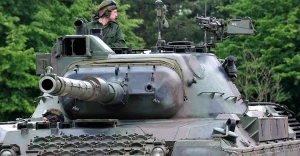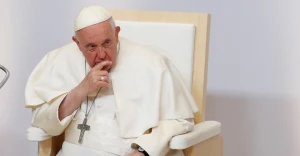
The last days of Russian church in Ukraine
Ukrainian authorities consider banning the Ukrainian Orthodox Church of the Moscow Patriarchate
Vladimir Putin's decision to invade Ukraine has had many unintended consequences, from pushing Sweden and Finland to join NATO to turning Russia into a pariah state. And now we can add to this list the situation with the Ukrainian Orthodox Church of the Moscow Patriarchate, UOC (MP), which was once a useful tool of the Kremlin's influence. This was reported by the US-based Politico newspaper.
The Ukrainian authorities are considering banning this church, and opposition parties have already prepared a bill. President of Ukraine Volodymyr Zelenskyy is expected to make a statement soon about the future of the UOC (MP): either a complete ban or the possibility of creating a new church devoid of any ties to the Russian Orthodox Church and its leader, Patriarch Kirill, who is an active supporter of the invasion.
“But even without the ban, support for the UOC (MP) is rapidly declining. More and more priests and Orthodox Christians are willing to transition to the independent Orthodox Church of Ukraine (OCU)”
Since the invasion, more than 200 parishes have already switched allegiance; many more are planning to switch but face obstacles from UOC (MP) authorities who are trying to prevent this, such as the Church of the Archangel Michael in the village of Zadubrivka, southwestern Ukraine.
Violence has also occurred. On Sunday night in the village of Miliyeve, Chernivtsi region, where the UOC (MP) rules, the Iov Pochaivsky church and a shop were set on fire. According to local police, a man who committed the arson was arrested.
"One of the most beautiful churches in the Vyzhnytsia district was set on fire last night - professionally, without a chance of salvation," the Chernivtsi-Bukovyna Diocese of the UOC (MP) wrote on Facebook.
Recently, the community of St. George's Church in Lviv voted to leave the UOC (MP). In March, hundreds of the church's priests were ordered to leave the Kyiv-Pechersk Lavra, a 21st century Orthodox monastery complex and one of the most revered sites of Orthodox Christians. Last weekend, control of the Lavra's Assumption Cathedral was transferred to the OCU in time for Easter services. And, despite predictions of trouble and protests, Easter in the Lavra was peaceful and without clashes.
Many parishioners of the Lavra continue to live and still pray with their families in the Assumption Cathedral, which was destroyed by the Red Army during the retreat in 1941 and restored in the 1990s.
They left the Cathedral, lined up to receive the blessing of the OCU priests, who sprinkled holy water on baskets of homemade paska (Ukrainian Easter cake) and other food. And inside the church, they prayed, standing under golden chandeliers, inhaling sweet incense, whispering prayers and participating in a complex Orthodox ritual with the saints who looked down on them from golden-bordered icons.
“Father Stefan, 29, was among the clergy. "Many older people came to church today because they were thinking first and foremost about Ukraine, not about the Moscow Patriarch, who they believe supports the Russian invasion," he said.”
"Of course, this is a difficult step for many, about half of them have a hard time adapting. But they realize that this is very important for the spirituality of our country. They have sons, daughters and friends on the front line, and they are sure that the Church should be with the Ukrainian people, with the Ukrainian army," he added.
"So, half of the people come and do not experience any difficulties, while others are still considering their transition," he said. But the clergyman is confident that religious faith and national identity will go together. According to one poll, only 4% of Ukrainians now formally identify themselves with the UOC (MP).
The expulsion of monks with ties to Moscow from the Lavra, a decision that is being appealed in court, is part of a broader crackdown on the UOC over suspicions that its leadership and some priests are disloyal to Ukraine and act as a fifth column in support of the Russian invasion. Formally, their 10-year agreement to use the state-owned Lavra has expired, but the government has refused to renew it, claiming that there were lease-related violations.
In 2018, despite the Kremlin's fierce opposition, the Lavra was granted a new lease. A year later, the Patriarchate of Constantinople granted the OCU a Tomos of autocephaly. In a sign of the political fault line underlying the feud, the OCU churches offered support to the 2014 Maidan protesters who ousted Viktor Yanukovych, Moscow's satrap in Ukraine. The UOC has remained loyal to Moscow, and the Russian patriarch severed ties with Constantinople, the highest Orthodox authority, due to the granting the Tomos to the OCU.
Previously, the Zelenskyy government was hesitant to act against the Moscow Church in Ukraine, not wanting to cross any boundaries of religious freedom, violate European Union or international norms on religious protection. They tried not to offend the church's supporters, knowing full well that among its priests and believers there are many patriotic Ukrainians, some of whom fought at the front line against the Russian invasion.
“However, there is evidence that church leaders have been supporting the enemy to varying degrees, encouraging a change of heart amid public calls for action”
More than 50 priests, according to the latest estimates, are under investigation for collaborating with Russian troops. One of the most prominent is Father Mykola Yevtushenko, who is accused of collaboration during their brutal 33-day occupation of Bucha, when he blessed the invading soldiers and urged his parishioners to welcome the invading forces. In addition to attempting to put the church's stamp of approval on the invasion, he also pointed to local residents who were most likely to resist the occupation of Bucha, a suburban town northwest of Kyiv that has become synonymous with war crimes.
In November and September, searches of UOC (MP) buildings uncovered pro-Russian literature and Russian passports. Earlier this month, the church's highest-ranking religious leader, Metropolitan Pavlo, was placed under house arrest ahead of a hearing to determine whether he incited sectarian hatred and glorified the Russian invasion. The Metropolitan calls the actions against him and his expulsion from the Lavra politically motivated.
The Kremlin is trying to use the measures against the UOC (MP) for propaganda purposes. In the middle of the week, Western media, including POLITICO, and human rights organizations were attacked by thousands of spam bots, allegedly from ordinary Russian citizens, who expressed deep concern that Ukraine was "provoking an inter-religious war." Spam bots from fake accounts complained that the Ukrainian president was throwing monks out into the streets, violating international norms and freedom of religion.
Most Ukrainians see it in a different light.
A survey conducted in December by the Kyiv International Institute of Sociology showed that
78% of Ukrainians believe that the state should intervene in the activities of the UOC (MP); 54% believe that the church should be banned completely, and 24% prefer a softer version of state control and supervision. Only 12% believe that the UOC (MP) should not be put under scrutiny.
Opposition MP Mykola Kniazhytskyi from Lviv says that leaving things as they are is not an option. He is the author of a draft law that bans the UOC (MP) but allows for the creation of a new church, clearly separated from the Russian Orthodox Church, or joining the autocephalous OCU. "This church was created by Russia," he said.
"Some priests are spies in cassocks, and people just don't want to take it anymore," he added. "The church is teeming with pro-Russian priests, and although not all of them are agents, they are ready to help and perform certain tasks for Russia."
- News













































